Retiring to France from UK – A Visa & Relocation Guide

When you get to retirement age, you want to be able to spend your newfound freedom enjoying life to its fullest, without the stress of work pressures.
It is at this conjecture that many consider a move to France, but why is France such a popular choice for British retirees?
With its relaxed pace of life, rich culture, world-class healthcare, and varied landscapes, it offers everything you need for a rewarding retirement.
Whether you’re dreaming of a rustic stone cottage in the Dordogne or a modern apartment on the Côte d’Azur, the property market is incredibly diverse and welcoming to overseas buyers.
Crucially, the cost of living in many parts of the country remains more affordable than in the UK, particularly when it comes to groceries, dining out, and housing outside the major cities of France.
Combine that with good transport links to and from the UK, and it is very clear why France remains a top choice for those looking to enjoy their later years in comfort.
Life in France: What to Expect as a Retiree
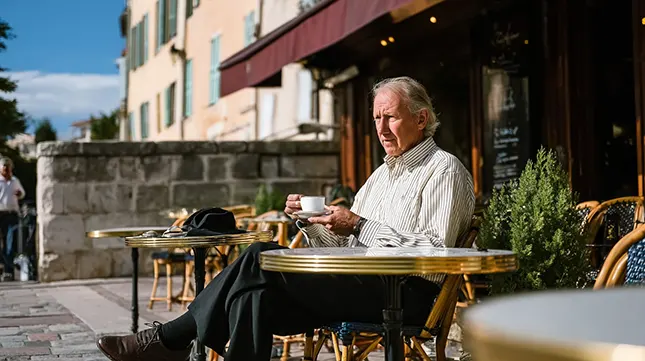
Relaxed café culture and community markets—retirement in France offers a charming, slower pace of life.
Retiring in France offers a refreshing change of pace.
Locals enjoy long lunches, excellent food markets, and a strong sense of community, especially in rural towns and villages.
You’ll quickly notice that almost everything from banking to bureaucracy moves a little slower than in the UK, but that slower rhythm is part of the charm.
Shops often close for lunch, Sundays are for rest, and neighbours still take the time to chat over coffee.
Public transportation is reliable in larger cities, although rural areas may require a car.
You’ll also find a strong emphasis on work-life balance, even in retirement.
Whether you prefer cultural immersion or a peaceful countryside, France offers a lifestyle that allows you to enjoy your golden years truly.
Understanding the Post-Brexit Retirement Landscape
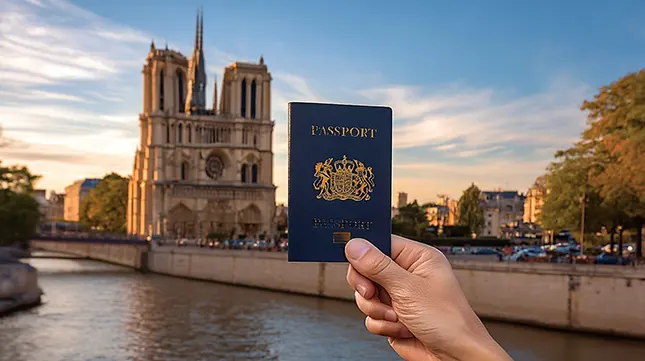
Post-Brexit retirement in France requires some extra planning, but thousands of Brits continue to successfully make the move each year.
Sadly, since Brexit, retiring to France from the UK requires more planning than before; nonetheless, it is still very much achievable.
UK citizens are now considered third-country nationals, which means you’ll need to apply for a long-stay visa if you plan to live in France for more than 90 days within any 180 days.
Fortunately, France offers clear pathways for retirees who can demonstrate sufficient income and healthcare coverage.
While the process is more formal, thousands of Brits continue to relocate each year successfully.
It’s also worth noting that bilateral agreements between France and the UK ensure that pensions and healthcare rights are still protected under certain conditions, a very real concern among those considering a move to France.
To stay up to date on post-Brexit changes, visit the UK government’s France travel advice page.
How to Obtain a Long-Stay French Visa
For those planning a “French Retirement”, a long-stay visa (visa de long séjour) is required.
This visa permits you to stay in France for more than 90 days and is the first step towards obtaining a residency permit.
The most common route for retirees is the “visitor or tourist” visa, which suits those who don’t intend to work in France but can prove they have sufficient financial means.
You must apply for your visa before leaving the UK, ideally at least three months in advance.
The application is submitted via France-Visas, the official portal. Once approved, you’ll receive a visa that’s valid for a year.
After arriving in France, you’ll need to validate your stay online and, in most cases, apply for a Carte de Séjour (residency card) if you plan to stay long-term.
It’s essential to gather all the correct documentation in advance and ensure you meet the financial and health insurance requirements.
Essential Documents You’ll Need to Apply
The process of submitting your visa application is not as daunting as it might first seem; however, it involves providing a well-prepared set of documents.
Requirements can vary slightly depending on your circumstances, but generally, you will need:
- A valid UK passport (issued within the last 10 years, with at least 6 months’ validity remaining)
- Completed visa application form from France-Visas
- Proof of financial means (e.g. pension statements, savings, or regular income)
- Proof of accommodation in France (rental contract, property deed, or a signed attestation d’hébergement)
- Private health insurance that covers all risks in France
- Passport-sized photos
- A cover letter explaining your reasons for moving
Ensure that all documents are translated into French if necessary.
It’s also wise to bring extra copies and allow time for processing delays.
Appointments are typically held at your nearest French visa application centre, which can be found via TLScontact.
The advice here is to be thorough and gather all the required information in a timely manner so that your first submission is accurate. Any mistakes can lead to lengthy delays.
Use a Migration Agent for Your Move to France

Using a migration agent can make your move to France smoother, easier, and stress-free.
If you are concerned about submitting your applications yourself, consider using a migration agent.
Navigating the French immigration process can be complex, particularly for retirees unfamiliar with legal terminology or bureaucratic procedures.
A migration agent can simplify the process by ensuring your visa application and supporting documents are complete, accurate, and submitted correctly, eliminating any stress.
They stay up to date with changing immigration laws, offer tailored advice, and can help avoid costly delays or rejections.
Agents can also assist with follow-up steps like registering your visa upon arrival and applying for a Carte de Séjour.
While it’s possible to use independently, many retirees find peace of mind in having professional guidance.
To find a regulated adviser, you can consult the Official List of Immigration Advisers or seek recommendations from expat forums, such as Angloinfo France.
Your Pension and Financial Planning in France

Plan ahead to ensure your pension and finances support a comfortable retirement in France.
One of the most important aspects of retiring abroad is ensuring your pension works smoothly across borders.
The UK State Pension can be paid into a French bank account, but the amount will be fixed in pounds, so you’ll need to consider exchange rate fluctuations.
You should notify HMRC and the International Pension Centre of your move.
You may also be eligible to transfer private or workplace pensions, but always seek independent advice before doing so.
France has a tax treaty with the UK to avoid double taxation, but you’ll still need to register with the French tax authorities and declare your income annually.
Engaging a bilingual tax advisor in France can be invaluable to help you navigate the system and avoid penalties.
Financial Implications for UK Retirees in France
While retiring to France offers many financial advantages, such as more affordable housing and lower grocery prices, there are still some important financial matters to plan for.
You’ll need to demonstrate financial self-sufficiency when applying for your visa, which currently requires proving an income equivalent to the French minimum wage (SMIC), approximately €1,400 (£1,176) per month per person in 2025.
You’ll also need to account for private health insurance (around €100/€150 – £85/£126 per month per person), property taxes, and perhaps the cost of a bilingual financial adviser.
If you sell property in the UK, you should also consider potential capital gains tax implications.
To help understand your new obligations, check out the guide to taxation in France from Impots.gouv.fr.
Proper planning can help you enjoy a more relaxed lifestyle without financial surprises.
Managing Currency Transfers and Exchange Rates
Once you’ve made the move to France, managing your money across two currencies becomes a daily reality.
Many retirees opt to open a foreign currency account or utilise a specialist transfer service to avoid high bank fees and unfavourable exchange rates.
Companies such as Wise and Halo Financial offer competitive exchange rates and allow you to set up regular pension transfers.
These services can also alert you to favourable rates, saving you money over time, particularly when transferring larger sums of money, such as a house purchase.
Using a multi-currency account means you can hold both GBP and EUR, making it easier to manage property bills, insurance, and everyday expenses in France.
Shopping around and choosing the right provider can result in thousands saved throughout your retirement.
Healthcare for Retirees in France

France’s world-class healthcare is a key benefit attracting many British retirees.
France’s healthcare system is often ranked among the best in the world, an appealing factor for many British retirees.
Once you’re a legal resident, you may be eligible to access l’Assurance Maladie, the French public health system, which typically reimburses up to 70% of medical costs.
The remaining amount is often covered by a mutuelle (top-up insurance), which many retirees opt to buy.
Initially, however, you’ll need private health insurance that covers you for the duration of your long-stay visa, which is a visa requirement.
After living in France for three months and establishing residency, you can apply to join the public system via PUMa (Protection Universelle Maladie).
To learn more about health insurance and registering for care, visit Ameli.fr.
Safety and Security for Older Residents
France is generally a safe country, with low crime rates in rural areas and smaller towns, making it a popular choice for retirees.
While urban centres like Paris or Marseille have typical city issues, most retirement-friendly regions, such as the Dordogne, Brittany, and the Loire Valley, are known for their peaceful and neighbourly environments.
Healthcare access, emergency services, and local gendarmerie stations are widely available, even in countryside communities.
France also has a strong social security safety net, and older residents are well-respected in society.
For additional reassurance, the British Embassy offers assistance for expats, and it’s worth registering your presence via the UK Government’s Living in France guide.
Cost of Living and Everyday Convenience

Weekly markets and affordable groceries help keep the cost of retirement in France manageable.
While France isn’t the cheapest European country, the cost of living can be very reasonable, especially outside major cities.
Groceries, wine, public transport, and dining out are often more affordable than in the UK. Many retirees are pleasantly surprised by the weekly farmers’ markets, where local produce is sold at excellent value.
Utilities and fuel costs are comparable to those in the UK, although heating can be expensive in rural homes that rely on oil or wood-burning stoves.
Broadband and mobile phone packages are competitively priced, with providers like Free, Orange, and SFR offering nationwide coverage.
The slower pace of life does take some adjustment, banks, shops, and even pharmacies close for lunch, but it’s all part of France’s relaxed, people-first lifestyle.
For a breakdown of everyday costs, visit Numbeo, the cost-of-living website.
The French Property Market: What You Should Know
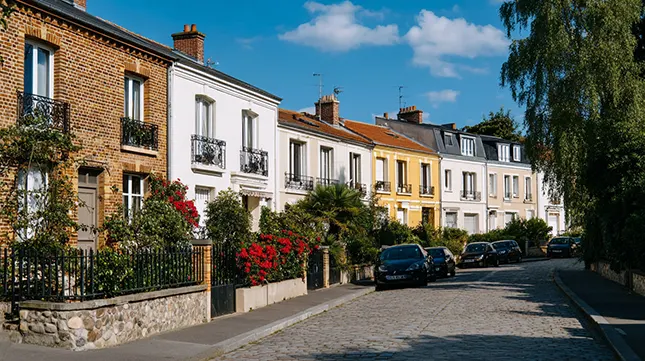
France offers a wide range of attractive, affordable properties ideal for retirement living.
France offers a wide range of properties to suit every taste and budget, from coastal apartments and village farmhouses to châteaux and country retreats.
Prices vary greatly depending on location. Areas like Paris and the Côte d’Azur are expensive, while regions such as Normandy, Limousin, and the Dordogne offer excellent value for money.
French homes often come with more land and character than their UK equivalents, though renovation is frequently required in rural areas.
It’s also worth noting that property taxes (taxe foncière and taxe d’habitation) and notary fees add to the cost of purchase.
To begin your search, visit trusted portals like Green-Acres or SeLoger.
Whether you’re dreaming of a vineyard or a seaside escape, France’s property market has something to offer every retiree.
Buying a Home in France – Step-by-Step
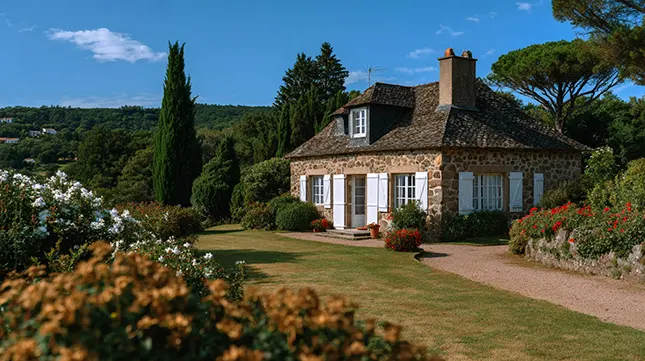
Understanding the step-by-step property buying process helps you navigate your French home purchase confidently.
Buying a home in France follows a well-regulated process.
Once you’ve found a property, you’ll sign a compromis de vente (initial sales contract), which outlines the terms of the sale. A deposit, usually 5–10% is paid at this stage.
A government-appointed notaire oversees the legal aspects and ensures both parties are protected. They will conduct property checks, manage the contract, and handle payment of taxes and fees. Completion typically takes 2–3 months.
It’s highly recommended to hire a bilingual solicitor or buying agent, especially if you’re unfamiliar with French law.
You’ll also need to consider exchange rate fluctuations if transferring large sums from the UK.
For more detailed guidance, consult Notaires de France, which explains the notary’s role and the buying process in English.
Hiring a Notaire or Estate Professional
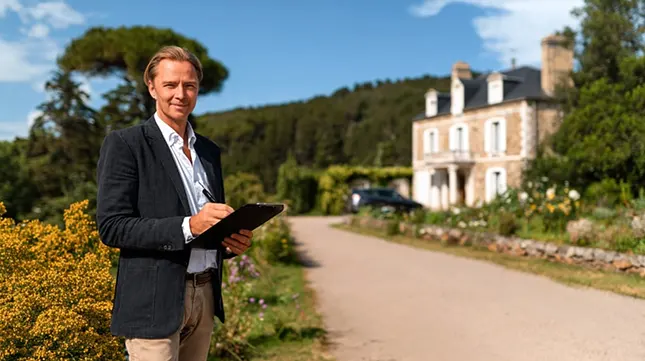
Working with a French notaire ensures your property transaction is legal, transparent, and stress-free.
In France, the notaire plays a central legal role in property transactions.
They are not just legal representatives; they act as impartial public officials, ensuring the transaction is legally binding and transparent.
You can choose your own notaire or share one with the seller.
Their fees are fixed by the government and typically range between 6–8% of the purchase price, depending on the property’s value.
While not mandatory, hiring a property consultant or relocation agent can be a smart move, especially if you’re buying from abroad or don’t speak fluent French.
These professionals can help with house hunting, paperwork, translation, and liaising with local authorities.
For those seeking UK-based help, organisations like France Property Angels or Leggett Immobilier offer tailored support for overseas buyers.
Where to Retire in France: Top Regions
Arguably, the most important aspect of your retirement to France is the location in which you will settle.
Yes, France’s sheer geographical diversity makes it ideal for retirees seeking everything from tranquil countryside to sparkling coastlines but, still it is a hard decision to make as so much is counting on getting it right.
Below are six standout regions that consistently attract expat retirees from the UK:
1. Dordogne – A Slice of Rural Paradise
The Dordogne, located in southwestern France, is a long-standing favourite among British retirees. Known for its rolling hills, medieval towns, and riverside villages, it offers a peaceful pace of life and excellent food and wine. Property here is relatively affordable, especially if you’re open to renovations. Weekly markets, outdoor cafés, and a warm climate make it ideal for countryside living.
2. Brittany – Charming, Coastal, and Accessible
If you want to stay close to the UK while still enjoying French culture, Brittany is a smart choice. Located in northwest France, it boasts rugged coastlines, historic towns, and affordable property. Ferry ports in Roscoff and St Malo offer easy return travel to the UK. The region has a strong Celtic influence and a welcoming expat community.
3. Normandy – A Short Hop from Home
Normandy combines proximity to the UK with pastoral beauty and a rich cultural history. It’s ideal for those who frequently drive to and from the UK. Known for its half-timbered houses, apple orchards, and coastal cliffs, it offers a relaxed, rural lifestyle with easy access to Paris.
4. Northern France – Great Value and Travel Links
Areas like Pas-de-Calais and Picardy offer terrific value for money. With excellent rail and ferry links, northern France is perfect for retirees who plan to travel frequently. The climate is cooler than the south, but the cost of living is lower, and you’ll find lovely countryside, small market towns, and a quieter way of life.
5. Central & Eastern France – Peaceful and Affordable
Regions like Limousin, Auvergne, and parts of Burgundy offer tranquillity, space, and low property prices. These areas are ideal for nature lovers and those seeking a more off-the-beaten-track retirement. You’ll find forests, mountains, and lakes—and often large properties at a fraction of UK prices.
6. Côte d’Azur – Glamour Meets Sunshine
For those with a larger budget, the French Riviera offers luxury living, Mediterranean sunshine, and a thriving international community. Towns like Nice, Antibes, and Menton are lively year-round, offering a range of cultural events, excellent healthcare, and stunning sea views. Property prices are high, but so is the quality of life.
Of course, there is a myriad of wonderful locations situated across this amazing country, discover even more areas via the kyero website.
French Culture, Language & Social Life

Learning French and embracing local culture enriches your retirement experience in France.
Embracing French culture is one of the most rewarding parts of retiring here.
From leisurely meals and wine tastings to local fêtes and open-air markets, daily life is deeply rooted in tradition and community.
Each region has its own character, Brittany feels different from Provence, and rural villages vary widely from urban hubs.
While many French people speak some English, especially in larger towns, to truly integrate into local life, learning the language will enrich your experience tenfold.
It opens doors socially and helps when navigating bureaucracy. Consider enrolling in classes at your local mairie or language centres such as Alliance Française.
The French place a high value on politeness, punctuality, and formality, especially in rural areas. A simple “bonjour” goes a long way in making a positive impression.
Planning Your Retirement in France: Timeline & Tips
So, are you ready to commit to your retirement dream?
A successful move to France starts with early, detailed planning.
Ideally, begin preparations at least 12 to 18 months before your desired move date. This gives you time to research regions, explore visa requirements, gather financial documents, and make property visits.
Six months out, aim to submit your visa application, secure accommodation, and arrange health insurance.
If buying a home, factor in the French buying process timeline, which typically takes 2–3 months.
It’s also a good time to consult with tax and pension advisors, transfer funds, and become familiar with local services such as doctors, banks, and insurers.
Make checklists and stay organised, planning is the key to a smooth transition.
Gov.uk’s Living in France guide is a reliable starting point for ticking off the essentials.
How White & Company Can Help Make Your Dream Come True

Sure, relocating abroad can be daunting, but with the right help, it doesn’t have to be.
White & Company has decades of experience helping UK residents make a smooth and efficient move to France.
Whether you’re downsizing, relocating heirlooms, or transporting large household goods, our team ensures your belongings arrive safely and on time.
Our comprehensive service includes expert packing, secure shipping, help with customs documentation, and delivery directly to your new French address.
With depots conveniently located across the UK and a trusted network in France, we offer the reassurance and logistical support retirees need.
Learn more or request a quote at HERE.
Your dream retirement is closer than you think!

Max is a seasoned writer and blogger in the real estate and home moving sectors, as well as a knowledgeable source of information for expatriates living and working abroad. His detailed insights have helped thousands of people move and live abroad with greater simplicity and ease.
Posted in: News
Leave a Comment (0) ↓


